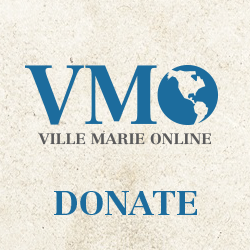I entrust you to the maternal care of our Mother who lives in the glory of God and is always by our side on our life’s journey.

Can faith and war be compatible?
Between the Rock of St. Peter and a Shard Place
|
The case in Syria is a complicated one, involving many grey areas and no clear path to take. However, as Roman Catholics, seeing injustices and human rights violations necessitates some course of action. To recap the situation, the President of Syria, Bashar al-Assad has been in power for over 30 years, marked by a regime replete with secret police, political prisoners, killing political opponents, and torture. As of 2011, a rebel group has sought to oust the embattled President in the wake of the Arab Spring uprising that began in Egypt. The two year civil war has claimed over 100,000 deaths, according to a June 2013 estimate by the United Nations. Furthermore, reports have indicated a high probability that al-Assad has used chemical weapons, including military grade Sarin gas. At first glance, the case for foreign intervention seems to be clear. However, the rebel group has purported strong ties to the terrorist group, al-Qaeda. Needless to say, a balance of power strategy that would back the rebels could potential install a fundamentalist and equally repressive regime. Furthermore, intervention would create a norm that killing civilians, while wrong, is permissable as long as Nuclear, Biological, or Chemical Weapons (NBC weapons) are not used -- a problematic red-line situation to say the least. Norms last far beyond any conflict, so this may be more damaging in the long term than anything else. Additionally, who would be involved in an intervention? The United Nations Department of Peacekeeping Operations (DPKO) is not set up to stop wars, but to maintain cease fires and negotiate a settlement. DPKO doctrine does not include a mandate nor the capability to halt an ongoing conflict. Foreign intervention is equally difficult, as Syria's alliance structure is linked with Russia. Western intervention in Syria could potentially spark a Great Power conflict between the West and Russia, broadening and deepening the conflict. This all being said, doing nothing is unpalatable. Pope Francis has visited several refugee camps and has argued that abandoned monasteries and convents could be used to house refugees fleeing harm. This is where our mandate of intervention should be. The Vatican could (and should) use moral pressure on the UN family of organizations, specifically the Red Cross and protected by small peacekeeping units to distribute aid to civilians fleeing the conflict. The Church's mission should be involved in assisting and running refugee camps for civilians to seek sanctuary and protection. In summation, the Church should not condemn or support intervention, but should continue a mission of protecting those caught up in the conflict, distributing aid and offering safe places of sanctuary. This is the mission of Peace and Hope for which the Roman Catholic Church is ideally suited. |
|
-Brent Gerchicoff is a PhD in Political Science at Concordia University, Montreal. |
Last Night at the Gayete

|
|
|
|
|
|
The Centaur Theatre's - season is drawing to a close with its final production of Last Night at the Gayety, a musical comedy by Bowser & Blue which runs until May 22nd. |
|
|


